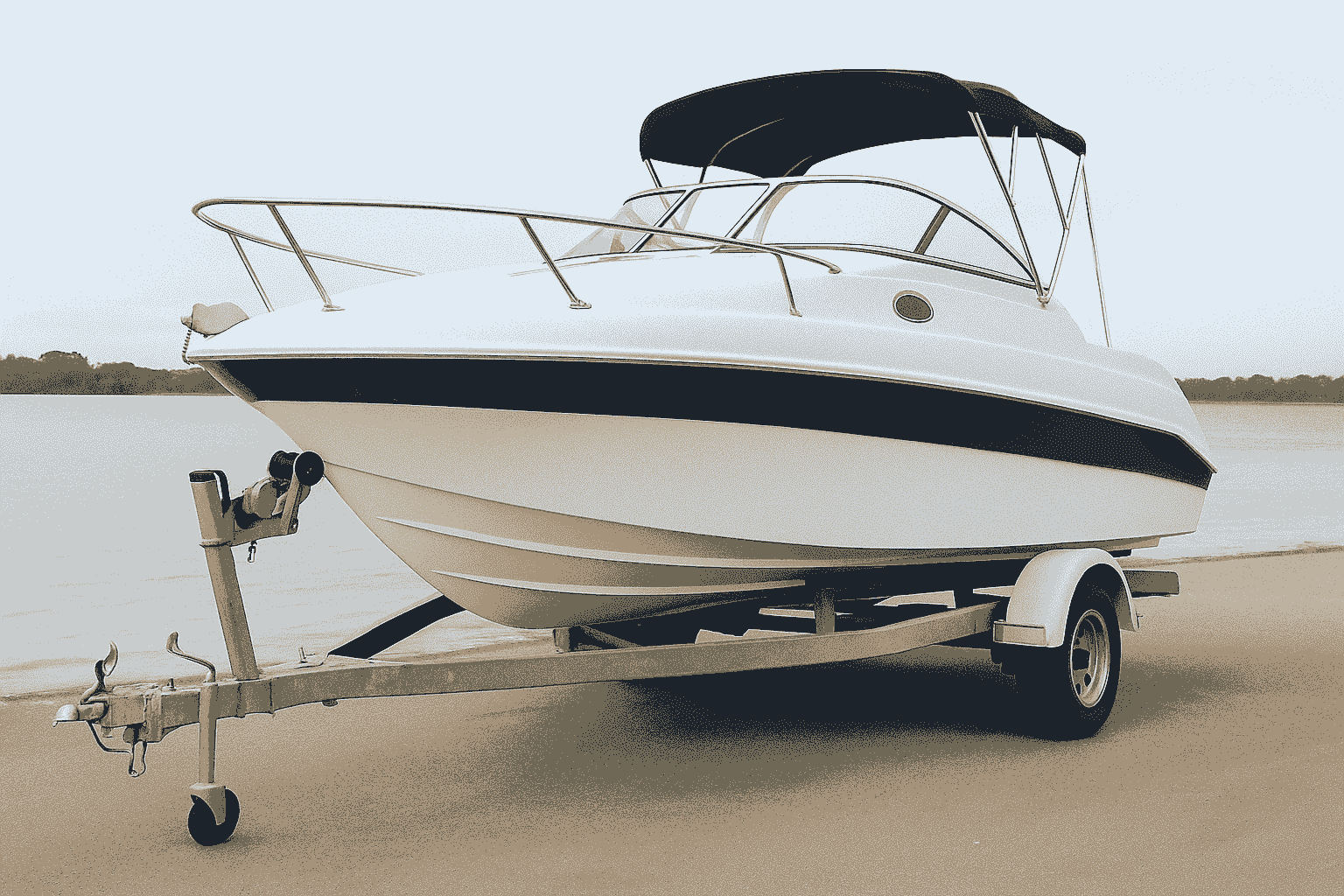Boat Damage
Author: New Wave Marine | Date: 03.02.23 | 10 min ReadWhether you're a seasoned boater or just getting started, owning a boat comes with a lot of responsibility. Not only do you have to keep up with maintenance and repairs, but you also need to be aware of the potential for damage. Boats are susceptible to all sorts of hazards, from bad weather to collisions with other vessels. And if your boat does sustain damage, it's important to know how to handle the situation correctly.
On this page
For boat owners, a lot of the fun comes with responsibilities
It's no secret that owning a boat can be a lot of fun.
From fishing to cruising around the lake, there's always something exciting to do on the water.
However, if you plan on owning a boat, you need to equip yourself with a basic understanding of boat maintenance and safety - otherwise, your day at sea might get cut short!
You'll have to keep up with regular engine maintenance like oil changes and fuel filters and make sure your fastenings are securely tightened so they don't come loose in rough waters. You'll also want to stock up on life preservers, such as life jackets and buoys, and navigational tools like a VHF radio or GPS system so you can stay safe while out on the open water.
Owning a boat certainly isn't all fun and games - but if you're prepared for the work that comes with it, you might just wind up having the time of your life!
One of the most important things you need to be aware of as a boat owner is the potential for damage to your vessel
Whether you're a proud captain of a motor pleasure cruiser or the helmsman of a sailing yacht sea-worthy fishing vessel, being a boat owner is a precious commitment.
While having access to the open seas is an exhilarating privilege, it also means making sure your boat is properly cared for and not in danger of any harm.
Routine maintenance and repair are standard practices that any savvy watercraft enthusiast performs to keep their vessel in peak condition, but what if other environmental factors can damage your boat?
Those who find themselves at the helm need to be aware of all the external risks at play - wind, waves, dock bumpers - it's essential that awareness trumps ignorance if one wants to maintain their beloved seafaring craft.
Aquatic adventures should be safe ones, so don't skimp on the knowledge when it comes to protecting your aquatic treasure from harm. After all, better safe than sorry!
There are many different types of boat damage that can occur, ranging from cosmetic issues to serious structural problems
Boats aren't just for looking pretty, sailing the seven seas and pretending to be pirates.
All kinds of vessels are prone to damage - from dinghies to yachts and extensive marine fleets.
Damage can vary from purely aesthetic problems like a chipped paint job, through medium issues such as cracked glass or a leaky fuel tank, all the way up to more serious structural issues such as twisted hulls, snapped masts and fractured keels.
Let's face it - when it comes to their boats, sailors really don't mess around.
There are also water-borne threats like algae or barnacles that can attach themselves onto and erode the delicate material of boat surfaces over time. If left unchecked, they can create much bigger problems that will take significantly longer (and more money) to fix - so if you spot something that looks fishy on your boat, it's best not to ignore it. Better yet, you can find out more about keeping the bottom of your boat clean, to prevent any marine hitchhikers.
If your boat does get damaged, take care of the problem as soon as possible to avoid further damage and costly repairs
It might be tempting to just shrug off any minor damage your boat may have sustained in the moment - after all, it's a lot easier (and more fun) to just keep on sailing!
But what many boat owners don't realise is that even a tiny tear or scratch in the hull can turn into a major problem quickly if left unaddressed. Before you know it, that little blemish could bring about pricey repairs and serious structural problems.
So if you run into an issue with your vessel, be sure to handle it sooner rather than later - there's no need for costly repairs when a little TLC every now and again should do the trick.
Keep proper maintenance and timely repairs on deck and you're sure to sail past all kinds of stormy seas!
Here are some tips on how to deal with different types of boat damage:
Boats can be a fun way to get out on the water and explore, but they require some level of maintenance - especially when it comes to dealing with unexpected damage.
Minor scrapes and scratches can happen due to bumps and collisions, while bigger problems like loose propellers or broken boards can come from weather-related conditions or faulty equipment.
If you stay vigilant and know what telltale signs of boat damage look like, you can save yourself repair headaches down the road.
Inspect your boat for any visible signs of wear and tear before going out on the water as well as when you return
All boat-goers should conduct a pre-season checkup before summer to ensure their boats are in tip top condition.
Before you set sail each time, give your vessel a once over to ensure there are no signs of wear and tear that could endanger yourself or passengers.
Many boating accidents take place before the boat is actually in the water, so you should start by inspecting the trailer to make sure there is no damage or erosion that could lead to an incident before you leave the car park.
While it's important to check the basics such as the steering and engine, it is also important to look at any visual faults onboard, which may include things like rips or tears in the sailcloth or cracks on the decking.
If you do experience any bumps during your voyage, make sure to double-check your boat afterwards for any dents or other signs of impact.
And if things get too rough, turn around! After all, sometimes it's better to abort the mission as soon as possible than risk an even bigger repair bill when it could have been avoided in the first place.
If you have a small crack in your hull, you can try patching it up with marine epoxy or fibreglass cloth and resin
If you ever find a small crack or hole in your hull, don't panic - depending on the type of hull, the fix is often simple.With a bit of marine epoxy, some fibreglass cloth, and resin, you can patch up the damage with ease. Even if you have very limited experience working with boats, epoxy is usually user-friendly and requires minimal skill - so don't let yourself get too stressed about small cracks. With some attention and care, this patch job could be the start of something beautiful... or at least seaworthy!
Just like any repairs, make sure you keep an eye on it afterwards and check for any further cracks or damage as necessary.
If your hull is severely damaged, it will likely need to be replaced by a professional shipwright
For any boat enthusiast, it can be truly heartbreaking to see their vessel in disrepair.
If you find yourself facing this situation, your first course of action should be to examine the extent of the damage to your hull.
Minor cracks and scratches may not require much more than some filler and a coat of paint, but if the damage is severe, it might just be time to call in a professional.
A qualified shipwright can assess the severity of the damage and let you know if your best option is replacement or repair.
Either way, a proper inspection by an experienced expert is vital for ensuring that you don't attempt any costly repairs that will only result in further deterioration that eventually leads to replacement.
Let an experienced shipwright determine what kind of TLC your vessel needs - saving you time and money!
If your engine gets damaged, you'll need to take it to a professional for repair or replacement
If you have had a collision or been caught in a storm, there is always the chance of damage to your boat electrical systems.
Unless you have the qualifications to safely take apart the heart of your boat, it is best to find a marine specialist to help provide assistance.
Any complex repairs should be carried out immediately to prevent engine failure on the water.
Be sure to check with your insurance company to see if any of the engine damage can be claimed.
If your sails are ripped or torn, you can usually repair them yourself with some needle and thread
There's nothing like the feeling of setting sail on a windy day. The blue waters, the view of the horizon - it's so very refreshing.
Unless ... you hear a rip or tear coming from behind you.
It's always such a letdown when that happens, especially when you're out at sea and don't have access to professional expertise to mend your sails.
Well, never fear!
Contrary to popular belief, fixing your ripped sails does not require supernatural powers -- just some basic needlework and threading will do the job. Simply take a steady hand and stitch up those small tears until they are gone without leaving a trace.
Along with being relatively cost-effective, this solution is also incredibly convenient since it requires only the most mundane of tools: needles and thread.
And who knows? After getting practice with it, you could even turn sail repair into your own part-time hobby (or possibly business).
Ensure your insurance company offers you the best policy possible
So there you have it, everything you need to know about dealing with boat damage.
Owning a boat is a lot of fun, but it's important to be prepared for the occasional mishap.
The best way to protect yourself from costly repairs is to get comprehensive boat insurance.
That way, if something does go wrong, you'll be covered.
You can find out more about boat damage, propellor limits and more in our detailed guide.
Learn More
Explore Blog categories
Want to receive the latest news and boating advice?
We offer a convenient newsletter subscription service that delivers the latest updates to your inbox. To sign up, visit our website and enter your email address in the subscription box. It's quick, easy, and free, and you'll be the first to know about any new products or services we offer
Thanks for signing up!

 (1).jpeg)




